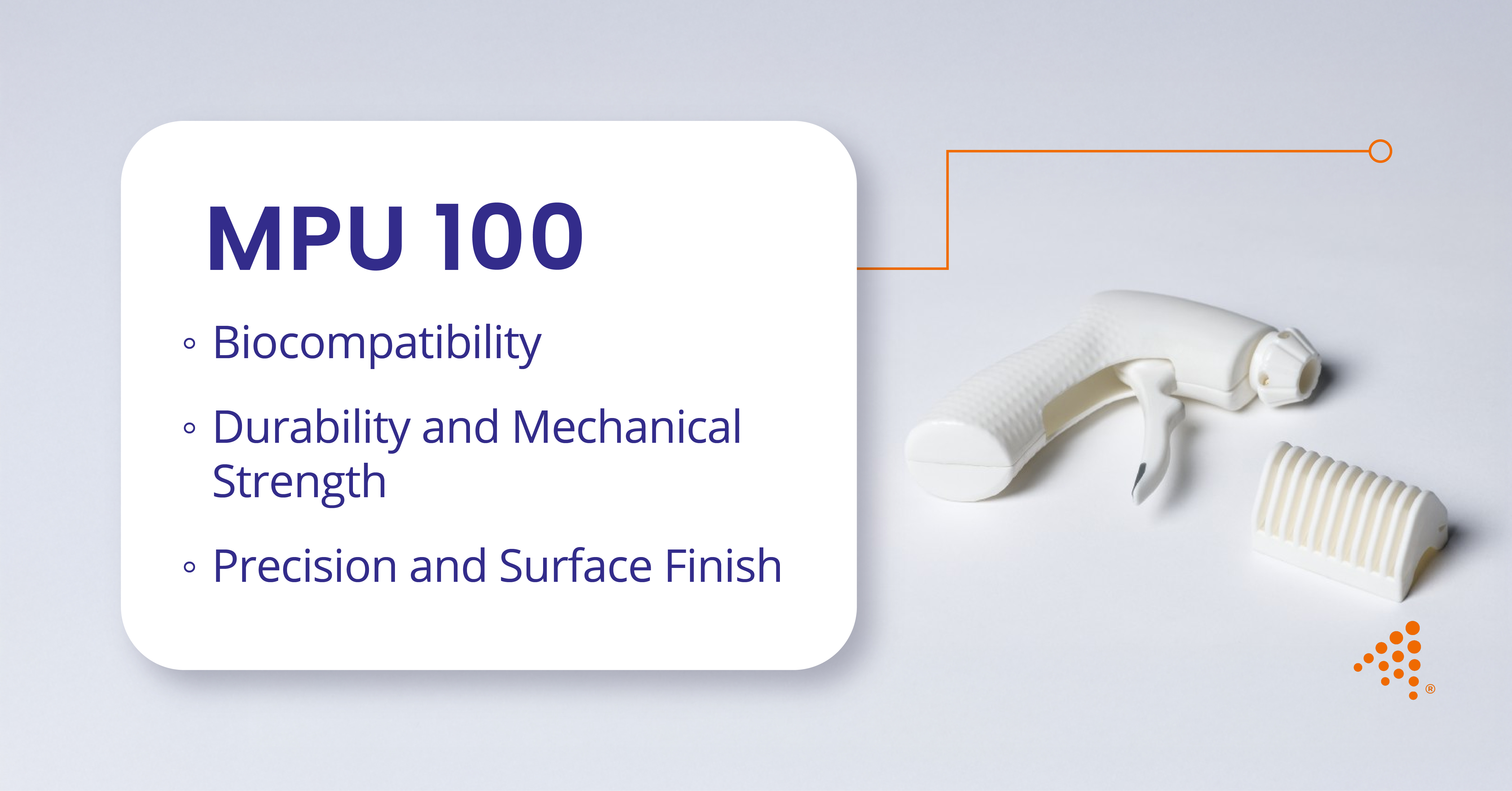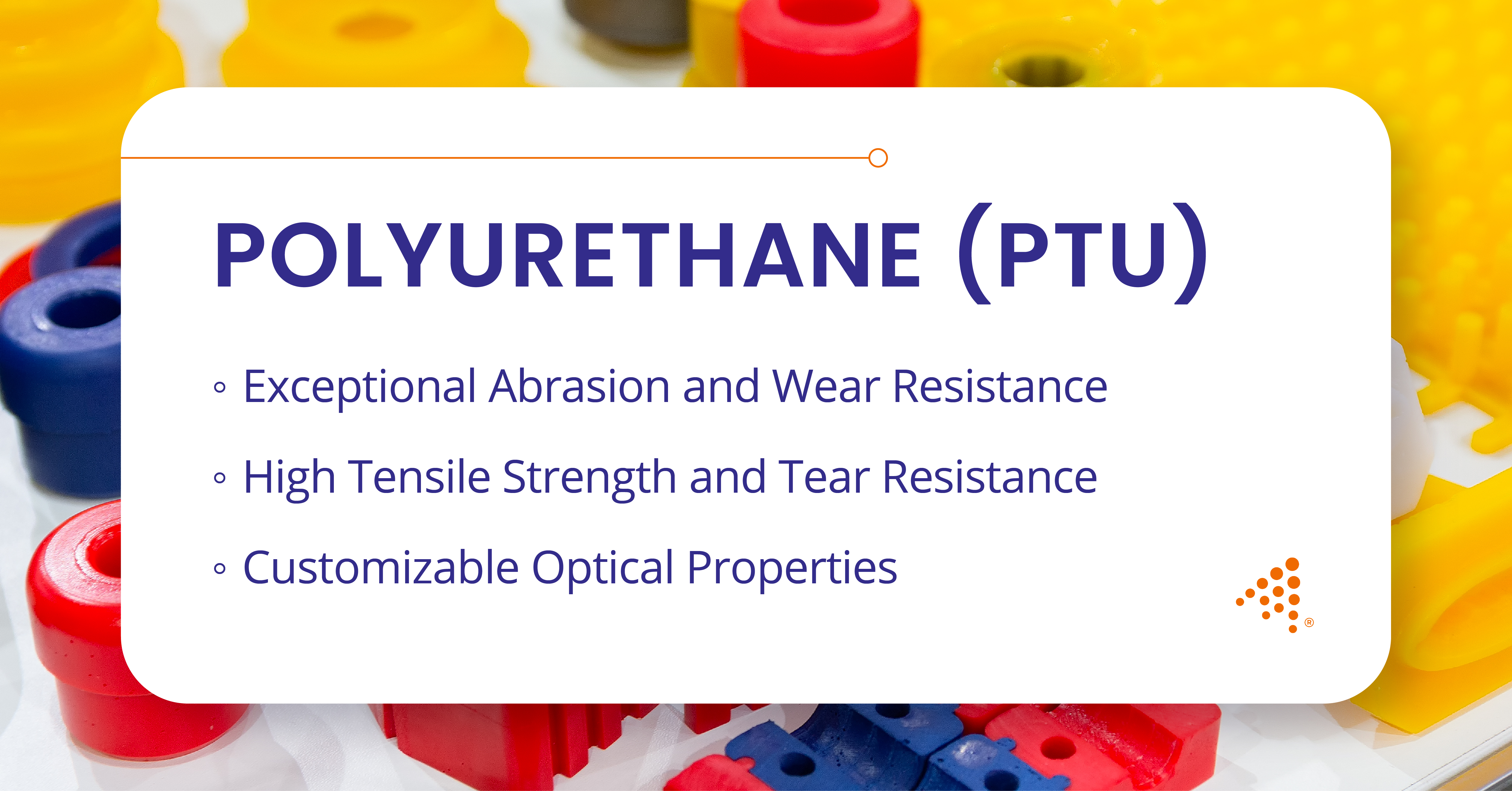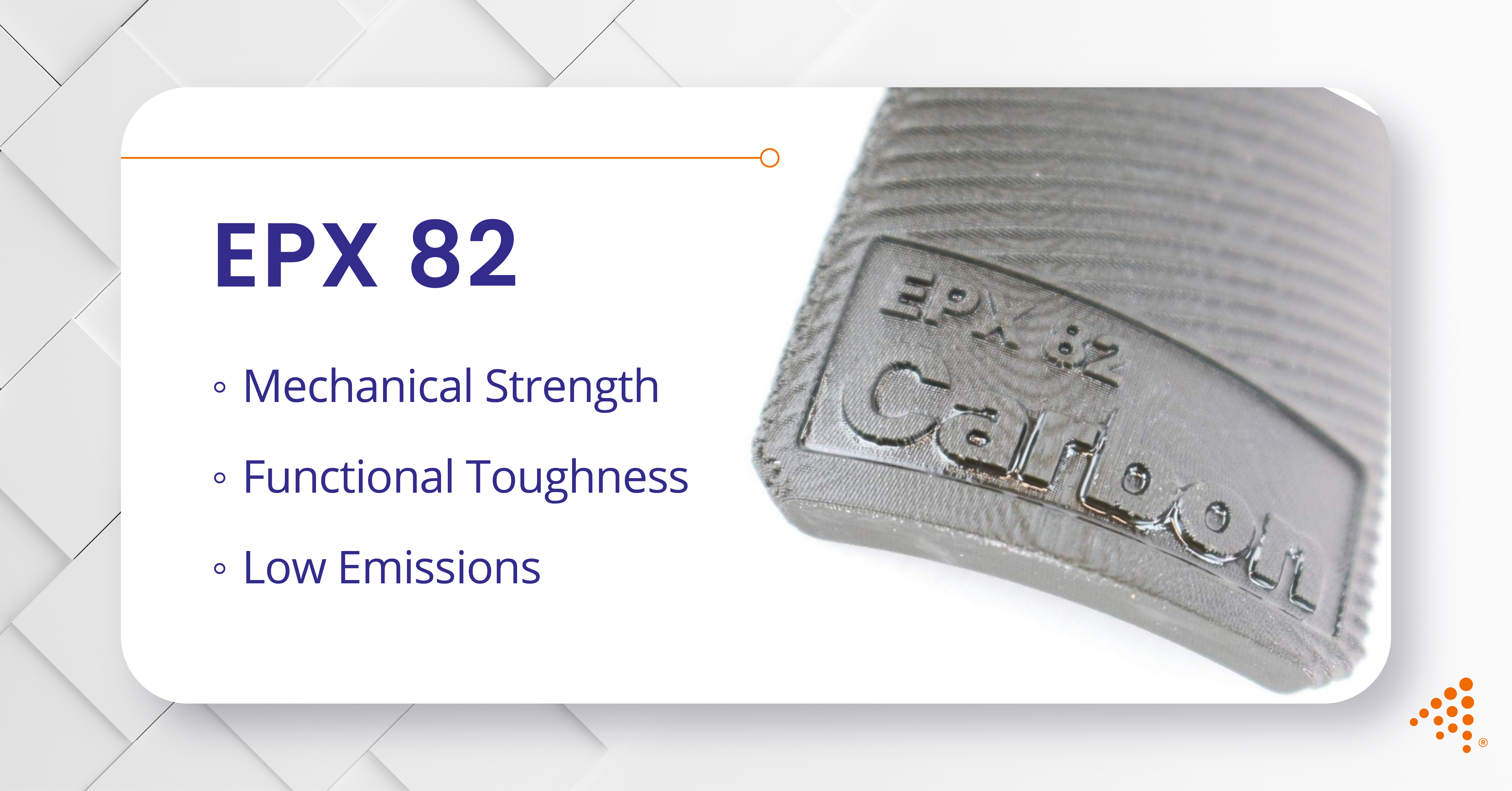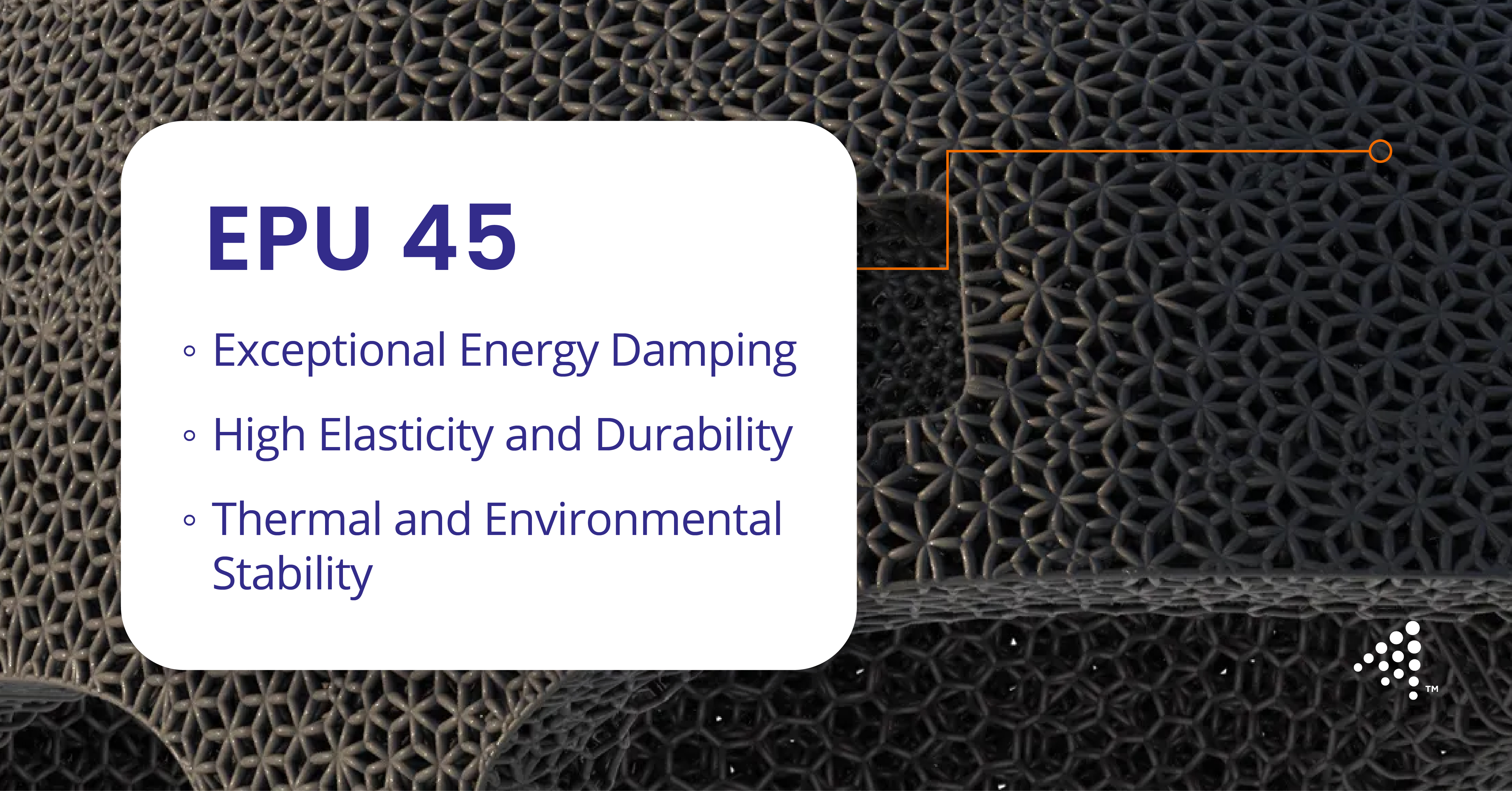Polyurethane (PTU): Durable, Flexible Resin for Diverse Use
Polyurethane (PTU) is a uniquely versatile class of polymers that exists in a variety of forms, from flexible and rigid foams to durable elastomers...
5 min read
Nick Erickson : Jun 4, 2025 10:20:58 AM

Medical Polyurethane (MPU 100) is an engineering-grade material specifically developed to meet the rigorous demands of the medical industry. Utilized in advanced additive manufacturing processes like Carbon's Digital Light Synthesis™ (DLS™), MPU 100 offers a unique combination of biocompatibility, sterilizability, and durability. This makes it a compelling choice for producing a wide array of medical components, from skin-contact devices to single-use surgical instruments and drug-contact devices, enabling manufacturers to accelerate development cycles and enhance product quality. While closely associated with Design for Additive Manufacturing (DfAM), MPU 100’s broader family of medical-grade polyurethanes also sees use in traditional methods such as Medical Injection Molding, expanding its utility across different fabrication techniques.
Read More About Nylon (Polyamide): Durable and Versatile for Many Applications
MPU 100 is distinguished by a set of properties that make it highly suitable for medical and healthcare applications. These characteristics ensure reliable performance in demanding environments.
A critical characteristic for any material intended for medical use, MPU 100 has been tested to USP Class VI and ISO 10993-5 (cytotoxicity), ISO 10993-10 (sensitization and irritation), and ISO 10993-23 (irritation) standards. This level of biocompatibility makes it appropriate for a variety of patient-contacting devices. It is essential for manufacturers to conduct final biocompatibility testing on the end-use product to ensure it meets all relevant requirements for its specific intended use.
MPU 100 is compatible with common sterilization methods used in the medical field, including ethylene oxide (EtO), electron beam (e-beam), and gamma irradiation. Importantly, it maintains its biocompatibility and mechanical properties post-sterilization, ensuring the integrity and safety of medical devices.
The material exhibits engineering-grade mechanical properties, including good tensile strength (around 35-38 MPa) and abrasion resistance. Its toughness is comparable to medical-grade Acrylonitrile Butadiene Styrene (ABS), making it suitable for components that require structural integrity and can withstand wear. It also demonstrates an elongation at break of approximately 25%, indicating a degree of flexibility.
MPU 100 withstands exposure to standard disinfectants and chemicals found in hospitals and labs, allowing for safer, longer-lasting use in secondary manufacturing processes.
When produced using Carbon's DLS™ technology, parts made from MPU 100 can achieve fine features, high resolution, and a great surface finish. This is beneficial for intricate medical components where precision and smooth surfaces are important for functionality and, in some cases, patient comfort. The material allows for isotropic parts, meaning its mechanical properties are uniform in all directions.
MPU 100 has a heat deflection temperature of around 50∘C (122∘F) at 0.455 MPa and approximately 38∘C to 40∘C(100∘F to 104∘F) at 1.82 MPa. While not a high-temperature material, this is sufficient for many medical device environments that do not experience extreme heat.
Explore our DFM development services and accelerate innovation with our ISO-certified manufacturing company built for modern healthcare needs.
The unique combination of biocompatibility, sterilizability, durability, and processability makes MPU 100 a versatile material for a growing number of medical and healthcare uses. Its application through additive manufacturing allows for the creation of complex geometries and customized devices.
MPU 100 is frequently used for various components within medical systems. This includes covers, guards, and housings that require mechanical strength, biocompatibility, and the ability to be sterilized. Examples include adapters for diagnostic analysis systems, such as the hemocytometer adapter for BD's Rhapsody single-cell genomic analysis system, where MPU 100 provided a cost-effective solution for complex geometries that would have been challenging for traditional injection molding.
Due to its favorable biocompatibility profile, MPU 100 is suitable for devices that come into direct contact with a patient's skin. This can range from parts of wearable medical sensors to components of prosthetic devices where direct skin interaction occurs. The material's good surface finish contributes to comfort in such uses.
The sterilizability and strength of MPU 100 lend themselves well to the production of single-use surgical instruments or components. Additive manufacturing services with MPU 100 allows for rapid iteration and production of guides, trials, and textured instrument handles that meet the functional requirements of the operating room.
MPU 100 can be employed in devices that come into contact with pharmaceuticals, such as inhalers, auto-injectors, and pill bottles. Its chemical resistance and biocompatibility are key factors for ensuring the safety and efficacy of these delivery systems.
In the bioprocessing field, components that require biocompatibility and chemical resistance for fluid pathways or sample handling can be fabricated using MPU 100. Its ability to form intricate channels and features through DLS™ technology is an advantage here.
Read More About Ensuring Consistent Quality with Tailored Quality Control Plans
While MPU 100, as supplied by Carbon, is a specifically formulated medical polyurethane resin, the broader field of polyurethanes in medical applications often involves modifications to tailor properties for specific needs. For MPU 100 itself, being a proprietary photopolymer resin, direct end-user modification with additives is not standard practice in the same way as with thermoplastic pellets used in medical injection molding. However, the development of such specialized resins inherently involves careful selection and incorporation of monomers, oligomers, photoinitiators, and potentially other additives by the material manufacturer to achieve the desired balance of properties like biocompatibility, mechanical performance, and printability.
MPU 100 is provided as a ready-to-print resin. The "modifications" are primarily part of Carbon's material science in developing the resin itself or through post-processing steps rather than user-added compounding.
Despite its many advantages, MPU 100, like any material, has considerations and potential limitations depending on the specific requirements of an application.
As noted, MPU 100 has a moderate heat deflection temperature. This means it may not be suitable for medical devices or components that are exposed to higher temperatures, such as certain steam sterilization methods or operating environments with elevated heat. Alternative sterilization methods like EtO, e-beam, or gamma are compatible.
MPU 100 is designed for use with Carbon's DLS™ additive manufacturing technology. The initial investment in this technology and the cost of proprietary resins can be higher compared to some conventional manufacturing methods and materials. While DLS offers benefits in speed, complexity, and reduced tooling costs, the per-part cost for very high-volume production might be a factor when compared against established high-volume injection molding processes for simpler geometries.
While MPU 100 meets stringent biocompatibility standards for many medical device categories, including skin contact and some short-term or single-use internal exposures, comprehensive data for permanent or long-term implantation applications is typically more extensive and material-specific. For long-term implants, materials with a very long history of in-vivo performance are often preferred, and specific regulatory approvals for such uses are rigorous. The manufacturer of the end-use part is always responsible for determining suitability for the intended application, including any long-term implantation scenarios.
Reach out to our team for design for manufacturing solutions that enable precise, regulatory-compliant components at unmatched speed.
Choosing MPU 100 is advantageous for medical product manufacturers looking to leverage the benefits of additive manufacturing for producing biocompatible, sterilizable, and durable end-use parts and prototypes. Its properties align well with the demanding requirements of the healthcare industry.
The ability to produce complex geometries, textured surfaces, and consolidated multi-part assemblies without the need for traditional tooling makes MPU 100 an excellent candidate for accelerating product development and enabling innovative device designs. Medical device manufacturers can iterate designs quickly and move to market faster with functional components. The material's compatibility with standard medical sterilization techniques ensures that parts can be safely integrated into clinical workflows.
Furthermore, its engineering-grade mechanical strength and abrasion resistance mean that devices made from MPU 100 can withstand the rigors of use in medical environments. For companies exploring advanced manufacturing for medical devices, particularly those requiring customization, on-demand production, or intricate designs that are challenging for conventional injection molding, MPU 100 offers a compelling pathway to creating high-quality, patient-safe products.
You can also view our Material Selection tool.

Polyurethane (PTU) is a uniquely versatile class of polymers that exists in a variety of forms, from flexible and rigid foams to durable elastomers...

Epoxy 82 (EPX 82) is a high-performance, rigid photopolymer resin developed by Carbon for its Digital Light Synthesis™ (DLS™) technology. This...

Elastomeric Polyurethane (EPU) 45 is a high-performance photopolymer resin engineered for the Carbon Digital Light Synthesis™ (DLS™) process. This...